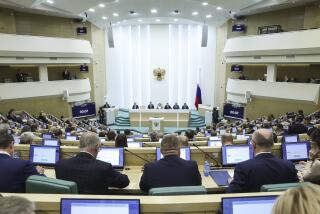U.S. Invites Soviet Experts to Observe Nevada A-Test : Rejects Proposal for 5-Month Moratorium
- Share via
WASHINGTON — The Reagan Administration invited the Soviet Union on Monday to send its experts to monitor a U.S. underground nuclear explosion in Nevada but rejected a new proposal by Moscow to halt all nuclear weapons testing for five months.
The Kremlin, in turn, turned down the U.S. invitation on grounds that sending observers to a nuclear test would only “legalize” it, news agencies reported from Moscow.
The Administration adamantly denied that its invitation merely was the latest move in a propaganda chess game between the two superpowers as they prepare for a November summit in Geneva between President Reagan and Soviet leader Mikhail S. Gorbachev.
“It’s not propaganda because it’s backed up by facts--the invitation is there. This is not something that we’re blowing smoke about,” White House spokesman Larry Speakes said.
But other officials, speaking on the condition they not be identified, privately indicated that propaganda was what Monday’s invitation to the Soviets mostly was about--at least the timing of it.
The Soviets had informed the Administration over the weekend that they intended Monday to propose a moratorium on nuclear weapons testing beginning Aug. 6--the 40th anniversary of America’s dropping of the first atomic bomb on Hiroshima. This was seen by Administration officials as strictly a propaganda ploy, they said both privately and publicly Monday.
The U.S. response was to beat Moscow to the punch by publicly issuing a test-monitoring invitation that presidential advisers already had agreed upon in principle. Speakes, in announcing the invitation, said that Reagan approved it sometime over the weekend at the presidential retreat in Camp David, Md.
The spokesman pointed out that the invitation stemmed from a proposal Reagan made last September during a speech to the U.N. General Assembly. At that time, the President suggested that the United States and the Soviet Union exchange visits by experts at nuclear test sites so they could measure the explosive power of the weapons.
“As a demonstration of our seriousness,” Speakes said, “the President has extended to the Soviet leadership our invitation for a Soviet team to observe and to measure a nuclear test at our Nevada test site. This offer, which is unconditional, is a unilateral step which clearly demonstrates the U.S. intention to go the extra mile.”
A senior Administration official, speaking to reporters on condition he not be identified, later said that no date has been set for the next U.S. test but that in the normal course of events, it probably would occur sometime this fall.
In disclosing Reagan’s invitation at the first opportunity he had on Monday, Speakes withheld the Administration’s knowledge that the Soviet Union within the next hour would publicly propose a testing moratorium. This was not disclosed by the White House until the anonymous Administration official later simultaneously announced and rejected the Kremlin proposal.
U.S. Urged to Join Freeze
In Moscow, the official news agency Tass carried a statement by Gorbachev announcing that the Soviet Union unilaterally would halt nuclear testing starting Aug. 6, “which is observed worldwide as the day of the Hiroshima tragedy.” He called upon Washington to join Moscow in the moratorium. But even if Reagan did not reciprocate, Gorbachev said, the Soviet Union would continue its own moratorium until Jan. 1, 1986.
The Reagan adviser, in rejecting Gorbachev’s proposal, said that the Soviet Union has a history of violating its own moratoriums, often in spirit and sometimes in letter.
The new Gorbachev proposal, he said, “follows years of extensive Soviet nuclear underground testing. . . . In fact, we’ve noted in recent weeks a significant acceleration in the number of nuclear tests by the Soviet Union. . . . Clearly, this was designed to put the Soviet Union in a position not to need to test over the next five months.”
Secretary of State George P. Shultz, en route to Finland for the 10th anniversary of the signing of the Helsinki accords on security and cooperation in Europe, was also critical of the Soviet offer. He recalled that the Soviets ended an earlier testing moratorium in the 1960s with one of the largest series of tests ever staged.
“History suggests that when they feel the need for more tests, they’ll break out with a bang, so to speak,” Shultz told reporters aboard his plane.
Times staff writer Norman Kempster in Helsinki also contributed to this story.
More to Read
Sign up for Essential California
The most important California stories and recommendations in your inbox every morning.
You may occasionally receive promotional content from the Los Angeles Times.














